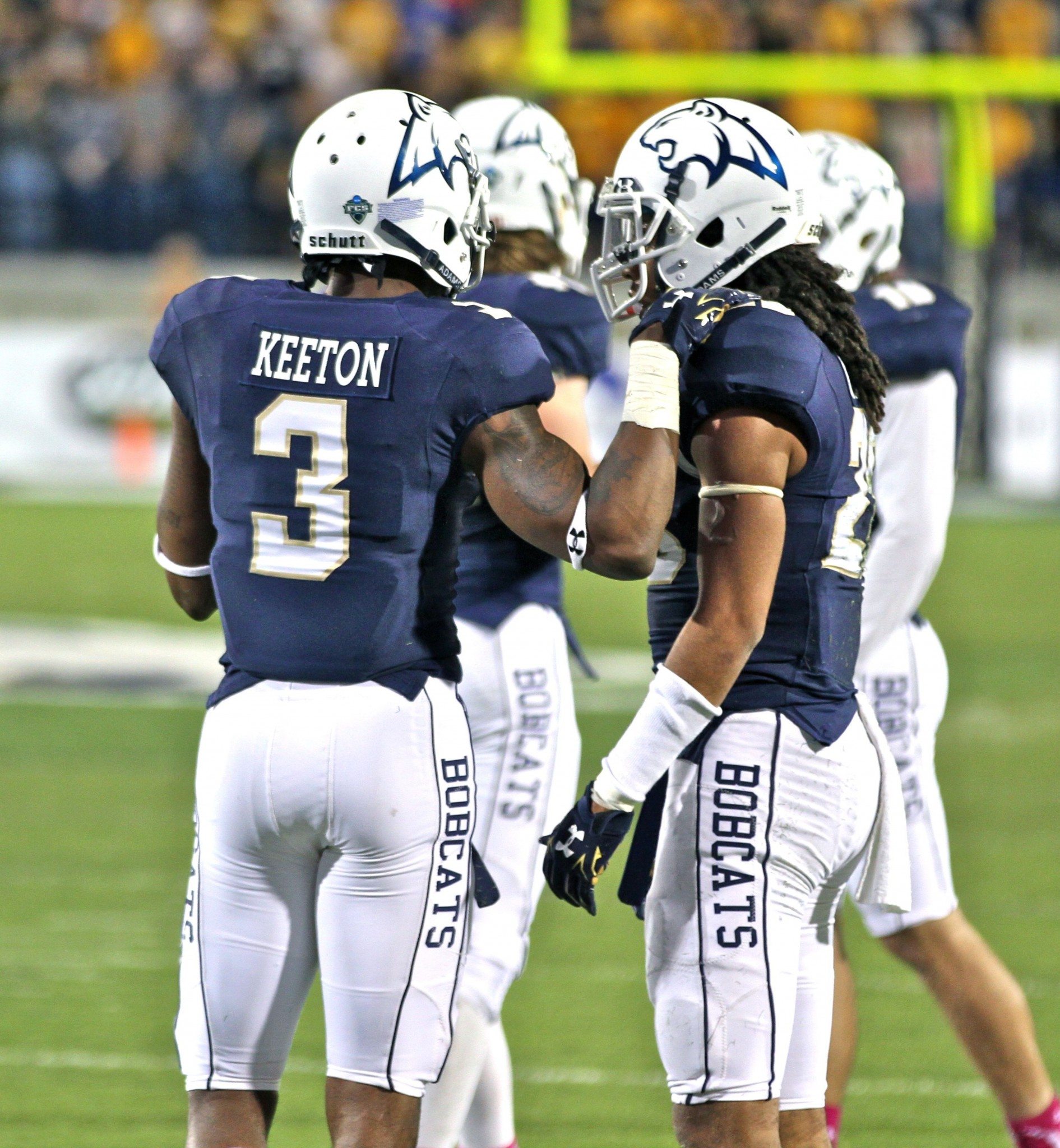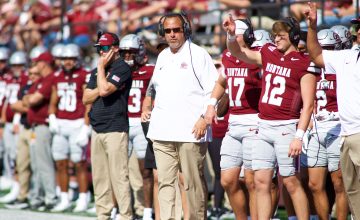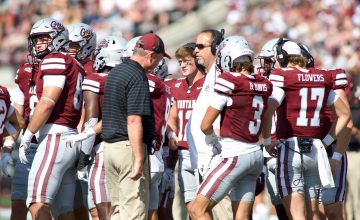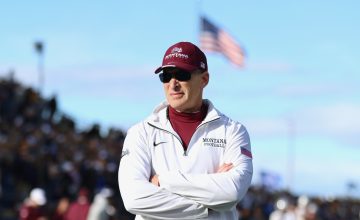Bryson Keeton will spend the summer gunning for an NFL roster spot. If all goes according to plan, DeMonte King will line up on the opposite sideline as Tre’Von Strong in a Pac 12 showdown on October 21 when King’s Arizona State Sun Devils take on Strong’s Utah Utes.
The trio was part of a Montana State secondary two years ago that looked, and produced, far from elite results.
The 2015 Montana State Bobcats had sky-high expectations entering the season only to see a talented roster underachieve to such a level the school fired one of its most successful football coaches just days after MSU’s first losing season in 14 years.

Former MSU cornerback Bryson Keeton (3) in 1-on-1 coverage against former EWU wideout Kendrick Bourne (11) in 2015
Those Bobcats lit up scoreboards across the Big Sky Conference. An offensive arsenal led by Dakota Prukop — a dual-threat quarterback who was the preseason BSC Offensive MVP and a post-season All-American —helped MSU lead the league and rank among the FCS national leaders in points per game (41.9) and total offense (520 yards per game). But a defense that gave up yards and points in bunches combined with that same explosive offense failing to convert in clutch situations resulted in a 5-6 record, MSU’s first losing mark since 2001.
In certain games — like Montana State’s 55-50 loss at Eastern Washington despite piling up a school-record 718 yards of total offense or MSU’s 59-42 loss at Portland State despite averaging 7.4 yards per rush against one of the league’s meanest defenses — the Bobcat defense quite literally looked like they had no chance to stop opponents. EWU quarterback Jordan West threw twice as many touchdowns (6) and he had incompletions. Portland State scored on nine consecutive possessions while piling up a school record 465 rushing yards
Montana State’s defense two seasons ago had deficiencies at all three levels. The Bobcats, just a few years earlier one of the top pass rushing teams in the country, struggled mightily to reach quarterbacks in the pass-happy Big Sky. Teams took advantage of MSU’s young inside linebackers, running right at Grant Collins and Blake Braun as Northern Arizona, Cal Poly, PSU and North Dakota all rushed for more than 250 yards against MSU. The EWU loss was just the first of several games in which an opponent shredded MSU’s “quarters” coverage scheme on the back end for the duration of a disheartening loss.
It all came to a head in a 54-35 loss to rival Montana in Bozeman. Two days after the loss, Rob Ash, MSU’s all-time leader in head coaching victories, was fired.
Two years later, a whole collection of players from that roster have found new homes. Former All-America offensive guard J.P. Flynn is preparing for his first NFL mini-camp with the San Francisco 49ers. Former All-America tight end Beau Sandland is shooting for a spot on the Green Bay Packers’ active roster in his second NFL season. Prukop, who played his final season at Oregon, is vying for playing time with the Toronto Argonauts of the Canadian Football League.
The continued success of the offensive talent that produced prolific numbers is not surprising. But a trio of players who made of Montana State’s much beleaguered secondary have also found their own individual success just two years removed from ranking 10th in the Big Sky in pass efficiency defense and last in the league in interceptions.
Keeton, a senior cornerback in 2015, King, a redshirt freshman safety in 2015 and Strong, a starting cornerback as a true freshman that season, have all landed on their feet, all at higher levels after all playing together in a secondary that received much scrutiny two seasons ago. Keeton is now a New York Jet while King signed with Arizona State in May and Strong participated as a preferred walk-on with fellow Pac 12 contender Utah during spring football.
“It was no surprise to any of us,” Strong told Skyline Sports in an interview in May. “It’s no surprise to me that Bryson got kept by the Jets and is on the active roster. It’s no surprise to me that DeMonte is going to Arizona State. And it’s not a surprise to them that I’m playing well at Utah. We all knew that these things would happen for each other and we just had to make it happen.”
Keeton, a two-year starter at MSU after transferring from Nevada, did not earn any sort of All-Big Sky recognition during his time as a Bobcat. The 6-foot-2, 190-pounder turned heads with an exceptional pro day in the spring of 2015. He now enters his second NFL season as a part of the active roster with the New York Jets. He was not reached for comment for this story.
In April, King committed to Arizona State. The former two-star recruit redshirted during the 2014 season, watching from the sideline as the origins of the defensive problems that would plague MSU started to pop up. He started the majority of his redshirt freshman season at safety in 2015 before abruptly leaving the program two games before the end of the campaign. The Los Alamitos High product spent last season at Long Beach College before earning his Pac 12 shot.
“It feels great and honestly, it feels well-deserved to be real,” King said in an interview with Skyline Sports in early May. “I thought I could’ve done this out of high school but there was a lot of coaching changes in the Pac 12 with the coaches that were recruiting me so I got left out of the mix. A lot of people don’t know that. I didn’t know about Juco back then. Montana State had offered me real late, a weekend before signing day, so I took the opportunity.”
“When I was at Montana State, I realized early on we had a good team talent-wise. A lot of people on our team knew that. But it’s like our coaches didn’t see that. They wouldn’t put the right people in the right spots, they didn’t play the right players. Everybody knew it but the coaches didn’t. I took note of that early my redshirt year and started to think about the future.”
Strong earned a partial scholarship out of Billings Skyview High but belied that evaluation almost immediately upon stepping foot on the field at Montana State. The athletic, long 6-foot-1 cornerback was the defensive standout of MSU’s 2015 fall camp, earning a spot in the rotation for the preseason Big Sky favorites and the No. 9 ranked preseason team in the FCS.
Strong started nine games as a true freshman, both taking his lumps and showing flashes of his potential as MSU’s defense struggled to find its footing running co-defensive coordinators Kane Ioane and Jamie Marshall’s convoluted scheme. In the first game of his sophomore year that also served as Jeff Choate’s head coaching debut, Strong bounced back from giving up two long receptions to talented Idaho receiver Deon Watson to snare a crucial interception late in MSU’s narrow 20-17 loss in Moscow.
Midway through last season, Strong fell out of favor with the new coaching staff and saw his game repetitions almost completely disappear. Montana State started four players — Strong, Chris Harris, Bryce Alley, Naijiel Hale — at the field cornerback position opposite All-Big Sky senior John Walker. Strong was not a part of that rotation the second half of MSU’s 4-7 season. In December, Montana State head coach Jeff Choate granted Strong his release.
“When you play football, you want to play at the highest level you can and when Utah told me they wanted me, it was like a dream come true,” Strong said. “My mind flipped into that mode where I had to get to work and start working out before I got up there so I could be in good shape.”
By January, he was enrolled at the University of Utah. By April, he was receiving rave reviews from observers of the Utes’ spring practices. He led the team with five interceptions and was among the top defensive backs with 10 pass breakups and two forced fumbles.
“I found myself doing things in spring ball that I didn’t do at Montana State, but going against those guys every single day made me get deeper into my tool belt and put all my skills out there,” Strong said. “It was something that came naturally. Every single day, I progressed.”
During his high school career, King played for legendary prep coach John Barnes at Los Alamitos, one of California’s football powerhouses. In Barnes’ 34 years at the helm, the Griffins posted 295 wins, 16 league championships and four CIF Championships — two in Division 3 (1991 and 1992); one in Division 2 (1993) and one in Division 1 (2002). His win total is the most in Orange County history.
Barnes helped mentor dozens of Division I recruits, including future NFL players Antoine Cason, Keenan Howry, Chris Kluwe, Ifeanyi Ohalete, Mike Paterson, Bernanrd Riley and Orlando Scandrick.
The 6-foot-1, 190-pound King received an offer from Sacramento State and heavy interest from UCLA, Auburn, Purdue, Virginia, Nevada, Colorado and Boise State during his prep days. He chose Montana State with an eye on starting his first year. Instead, he watched from the sidelines as Montana State made the playoffs for the fourth time in five seasons. King could already see the makings of the struggles that would end up costing Ash and most of his staff their jobs.
“When I came in to my redshirt freshman year, I’m balling in spring, summer I’m doing my thing but my position coach (Marshall), he has a demeanor to him that I knew I wasn’t getting a fair shake for whatever reason,” King said. “I don’t know if it was personal or what. I came in prepared out of high school. I guess he expected me to be a little more not prepared, do everything his way. I didn’t have a problem with that but I think he viewed me as a know it all because I was performing at a high level.
“He expected less out of me. I started talking to some of the players about it. They were like, ‘Yeah, you’re not wrong. This has happened before.’ EB — Eryon Barnett — had told me that when he first got there from Texas, Coach Marshall had limited his ability too. They didn’t play him much and he felt there was something personal against him too. He didn’t believe it at first but when he wasn’t playing after the injuries and stuff like that, it felt real personal.”
King said he would talk to Barnett, a former transfer from Texas who spent three seasons at MSU before abruptly passing away in the summer of 2015. The Bobcats seemed to have adequate if not elite talent on the back end, from first-team All-Big Sky cornerback Deonte Flowers who graduated in 2014 as a four-year starter to third-team All-Big Sky safety Rob Marshall, a fellow senior in 2014, to Keeton, King and Strong. The mid-season version of MSU’s 2015 secondary featured an NFL cornerback, two Pac 12 players and Desman Carter, an all-league performer at FBS Alabama-Birmingham before transferring to MSU for his final season.
“We had great players as everyone can see,” King said. “EB, Rob Marshall, Bryson, Tre’Von, we had great players. The scheme didn’t favor the players. We ran a quarters scheme that didn’t favor us and we were getting gash. There were games where Bryson Keeton — I’ve seen it with my own eyes — he’s giving the coaches adjustments and when we ran it, we won games and when they didn’t listen, we didn’t. I just kept thinking, ‘If I stay here, I’m not going to get the right film for the league and more importantly, we aren’t going to win.’ The scheme just didn’t fit. We couldn’t make plays like we knew we could.”
Strong, who played mostly safety his senior year at Skyview, saw similar problems early on. But as a true freshman starter, he chose to keep his mouth shut and let the older players do the talking. He noticed almost daily the lack of continuity in preparation. The Bobcats struggled to learn schemes with old elements of what Marshall employed with great success during MSU’s string of three straight Big Sky titles (2010-2012) along with new elements installed by Ioane, MSU’s longtime linebackers coach who was in his first and only season as co-defensive coordinator.
“I don’t really think Coach Ioane was able to do what he wanted to do, the stuff with Coach Marshall going on, the stuff with the coaching staff really hurt us as well,” Strong said. “We really didn’t know what we were doing week to week. It really didn’t feel like we were preparing for teams. It really felt like we were going week to week doing the same stuff. Coach Ioane wanted to do some stuff, Coach Marshall wanted to do some stuff and it really never worked out. They were not putting us in a position to succeed and that was our failure.
“But I knew it had nothing to do with what I could do or what DeMonte could do or Bryson could do. It had a lot to do with the position we were put in. In our situation, it has nothing to do with that we couldn’t cover. It’s that we couldn’t get to the quarterback. That’s my opinion.”
Montana State rushed the passer as well as any team in the country during the three straight league title runs to begin the decade. Defensive ends Caleb Schreibeis and Brad Daly won back-to-back Buck Buchanan Awards, recognition of their pass rushing prowess. Once the elite pass rushers departed, the defensive strategy began to fall apart.
“We talked about getting out all the time our freshmen year and even after DeMonte and I both decided to leave, us three have talked all the time about getting better opportunities,” Strong said. “It had nothing to do with our struggles that we faced throughout the season. It had nothing to do with us not being able to play the position. It was the situation we were put in. If you are a real football fan and you really know football, you know that if you are asked to play press man-to-man all day but you don’t have a d-line to get a pass rush, you are going to get passes completed on you all the time.”
For King, the losing helped him reach a boiling point. After MSSU’s 34-23 home loss to Southern Utah, King got into an argument with Marshall during a position group meeting. He quit the team on the spot and was granted his release before MSU went to Pocatello to earn its last win of the season, a 44-20 victory over Idaho State. Marshall served a one-game internal suspension that Saturday a week before he, Ash and most of the rest of the staff were fired.
“We were losing games because of that stubbornness,” King said. “If you can risk losing games over some personal motives, how are you going to care about what I’m going to do? You are risking your job losing these games. And then you lost your job. You really don’t care about me, you really don’t care about yourself. I had respect for the team. I left in a respectful manner. I just had to leave.”
Strong stuck it out one more year and seemed to be improving in his second season in the starting lineup. But the second half of MSU’s second straight losing season, Strong could be found on the sideline almost primary, both during home and away games. Now he and King have a chance to affirm their talent in the Pac 12.
“It was frustrating,” Strong said. “I remember being on the sideline seeing plays that weren’t made that I knew I could’ve made for us. But I did my best to try to help out those kids who did play in front of me as much as possible. As the season went on, I started seeing how things were going and I was like, ‘You know what? I really need to transfer.’ I needed a fresh start where I could really display my talents for another coaching staff who would really appreciate me.
“I never had many issues with the coaches, never got into any altercations with the coaches or my teammates. I feel like when I wasn’t playing, I knew I should’ve been playing. Kids were playing ahead of me last year that weren’t better than me and I lost my interest being there. It wasn’t the best situation for me anymore. I wanted to go somewhere else where my time was appreciated. I know those other guys feel the same way. Now we just have to keep proving everybody wrong.”
Photos by Brooks Nuanez. All Rights Reserved.



















